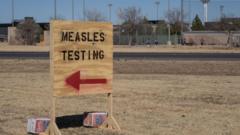A US government report detailing causes of children's chronic diseases references studies that academics claim do not exist. The controversy highlights concerns over citation integrity in public health reporting.
Controversial US Health Report Under Fire for Fabricated References

Controversial US Health Report Under Fire for Fabricated References
Academics refute claims in a government report on children's health that cites non-existent studies.
A recent US government report on children's health has sparked controversy after academics cited as authors of various studies claimed that those references are completely fabricated. Released on May 22, the report focused on the alarming rise of chronic health conditions among children in the United States. Following revelations from the digital platform NOTUS, an amended version of the report was published on May 29, admitting to the use of seven fictitious references.
The White House press secretary, Karoline Leavitt, attributed the issue to "formatting problems," insisting that the report's core conclusions remain valid despite these errors. The department, led by US Health Secretary Robert F Kennedy Jr., who has previously pushed discredited theories linking vaccines to autism, faces growing scrutiny due to the inaccuracies.
This initiative originated from a sweeping executive order issued earlier this year by President Donald Trump, aimed at investigating the extent of chronic childhood diseases and their possible causes. The report, which was created by the Make America Healthy Again Commission, outlined various potential contributors to these health crises, including poor nutrition, environmental hazards, mental health stressors, lack of physical activity, and misguided medical interventions.
However, several researchers named in the report have publicly dismissed the included studies, stating they had no involvement and that such research does not actually exist. Guohua Li, a professor at Columbia University referenced in a supposed report on children's mental health during the pandemic, called the citation "totally fabricated," stating he does not even recognize the cited co-author.
Norah Kreski, another supposed co-author, similarly denied authorship and expressed disbelief regarding the existence of the study. Katherine Keyes, an epidemiology professor who was also incorrectly attributed, remarked on the importance of accurate citation practices for competent scientific communication.
Another cited work on youth medication marketing was found to be similarly misattributed, raising alarm bells about the report's credibility. The Democratic National Committee has criticized RFK Jr.'s Health Department for basing its policies on citations that do not hold up, citing numerous errors including broken links and misrepresented conclusions.
Since his appointment as US Health Secretary in February, RFK Jr. has made significant changes, including mass job cuts within the department and suggested plans to conduct placebo trials for new vaccines, further stirring the pot in an already contentious healthcare landscape.


















